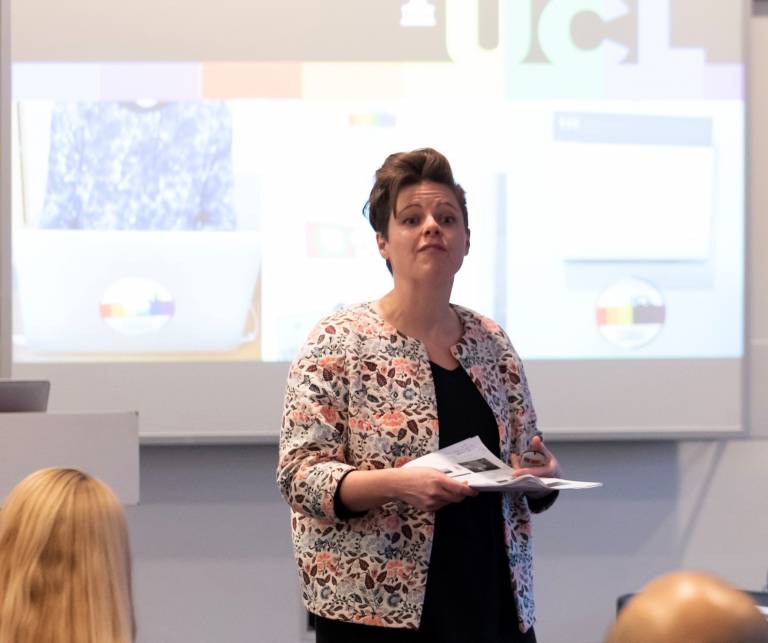CLIE colleague delivers session on LGBTQ+ equality at British Council conference
8 March 2019
Anne Moore, UCL CLIE’s Business Development Manager and Co-Chair of UCL’s LGBTQ+ Staff Advisory Group, writes about her conference session on meaningful LGBTQ+ equality imagery at the annual British Council’s International Education Marketing Conference in Manchester.

A revolutionary session?
In rainy Manchester, the British Council’s annual marketing conference followed a ‘Roll with it or Revolutionise?’ theme, asking universities to consider how they are adapting to a changing external environment.
Combining my roles at UCL, I co-delivered a session on meaningful university LGBTQ+ equality and its global visibility alongside the formidable Vanessa Varvas Director of Marketing & Recruitment for University of East London.
Together we focussed on equality for Lesbian, Gay, Bisexual, Transgender and Queer and / or questioning (LGBTQ+) staff and students at Higher Education Institutions (HEI) today.
The session, a first for the conference, reflected on the experiences of LGBTQ+ staff and students working within in international higher education and explored how imagery (such as the rainbow flag) may be received internationally at a time of heightened populism around the world. I got a lot more than I bargained for with this theme; conference attendees were engaged throughout and made some thought-provoking contributions.
UCL context
In general, it can be said that UK HEIs value gender and sexualities diversity in local contexts and communicate this increasingly in imagery used on promotional materials.
I am proud to say that in 2018, UCL was recognised in a national employer ranking as a Stonewall Top 100 employer for LGBTQ+ staff, and for the first time that year, UCL featured the rainbow flag on its undergraduate prospectus front cover.
In demonstrating the use of imagery to symbolise national equality agendas and awards such as Stonewall’s, the session focussed on personal reflections of LGBTQ+ staff working within global institutions at a time of more ‘challenging conditions’ internationally, according to the British Council.
The session explored how the rainbow flag has been received globally at a time of heightened populism and nationalism around the world; most notably illustrated by Russian 'anti-propaganda' laws that were introduced in 2013 to ban such imagery.
Participants from a range of HEIs, international education and commercial organisations strongly supported the use of LGBTQ+ symbols, though perceptions of it globally were still unclear.
International input
Some insight into the use and value of this sort of imagery was supported by findings from the British Council Pakistan. They had researched their own alumni experiences of UK HE, which had helped students to understand and form their identities as students whilst in the UK and then as graduates upon returning home.
However, the local meaning and national understanding of LGBTQ+ equalities symbols was not fully apparent in the student cases discussed. They did not always know their identity in this regard beforehand - nor the meaning of such imagery or symbolism.
This posed the question of how we might translate such imagery and how it can be really meaningful without explicit references, such as with a supplementary written remark in the UCL prospectus; and if the revolutionary prospectus cover picture was only really relevant locally or nationally in the UK. Attendees questioned whether staff would be at risk overseas if they pointed out the revelance to interested students or parents.
Ways forward when there are challenges
Moving away from symbolism, the session also covered real-life challenges on campus.
UEL’s Vanessa Varvas presented on inclusivity in the diversity spectrum and a great example of dealing with homophobia via social media on campus through cultural awareness and restorative practice.
This approach managed and understood within the international student’s academic department by bringing together those concerned and creating dialogue between those who had different understandings of sexualities and gender diversities.
It would be fair to say the session generated more questions than answers to this quite 'revolutionary' topic and the subject was of high interest to the British Council, as well as the range of delegates attending.
It was also great to undertake this as a part of an annual international event reaching such a range of attendees and to be able to herald the successes at UCL and UEL, as well as to ask questions on ways forward in the future for both institutions and the sector as a whole.
We'd love to hear from interested staff with any comments or questions on this topic too (anne.moore@ucl.ac.uk)
 Close
Close

